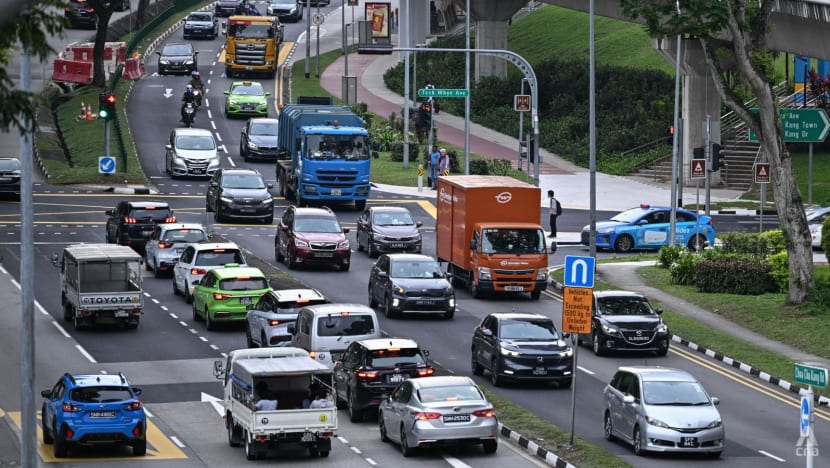Politics
Singapore’s Transport Minister Critiques Needs-Based COE Proposal

In a recent parliamentary discussion, Singapore’s Acting Transport Minister Jeffrey Siow expressed skepticism regarding a proposed needs-based system for the Certificate of Entitlement (COE). He characterized the proposal, put forth by opposition Member of Parliament Jamus Lim, as subjective and divisive, stating that it would benefit only a small number of individuals. The commentary came during a session on September 22, 2023, where various perspectives on car ownership and accessibility were debated.
Associate Professor Lim suggested implementing a discount-based system aimed at families with heightened transportation needs, such as those with multiple young children or caregivers for elderly parents. He argued that these groups face unique challenges in accessing public transport, which makes car ownership more critical for their daily lives. “Their need for private transportation is more acute than that of the average citizen,” Lim stated.
Details on the Proposal
Lim’s proposal included specific discounts for families based on the number of children. For instance, families with two or more children under the age of 14 would receive a 10 percent discount for each additional child beyond the first. This means a family with two children aged 4 and 7 would receive a 10 percent discount, while a family with three children between the ages of 2 and 13 would gain a 20 percent discount. Conversely, families with one child or those with older children would not qualify for any discount.
He also recommended a 10 percent discount for primary caregivers living with elderly parents aged 80 and above or parents with chronic illnesses requiring regular medical care. Lim acknowledged existing support for people with disabilities under the Disabled Persons Scheme, which offers a full waiver of COE for eligible individuals. However, he emphasized that the proposed discounts should apply at the time of car purchase and remain with the qualifying family if the vehicle is sold.
Despite the appeal of Lim’s suggestions, Siow pointed out the challenges associated with implementing a needs-based allocation system. He noted that what seems deserving to one individual may not appear fair to another, raising potential disputes over eligibility criteria. Questions regarding the age and number of qualifying children, as well as income considerations, complicate the proposal further.
Concerns Over Fairness and Market Impact
Siow highlighted that while families with special needs may indeed benefit from car ownership, the complexity of needs-based allocations could lead to discontent. “All these ideas sound very attractive, but no matter how one draws the line, there will always be people who fall on the wrong side of the line,” he remarked. He emphasized that creating a fair system would lead to ongoing debates in Parliament, ultimately undermining the objective of simplifying car ownership accessibility.
Furthermore, Siow argued against the notion of COE subsidies for specific families, stating that such funds could be better allocated to benefit a larger segment of the population. He proposed that rather than providing a significant subsidy to one family, the same amount could be redistributed to support many more individuals through initiatives such as credits for transport services or cash vouchers. He referred to the Large Families Scheme as a model for how this could work effectively.
Siow acknowledged the rising prices of COEs, particularly noting that earlier this month, Category A COE prices reached a record high of S$119,003 (US$93,171). He pointed out that the government is taking steps to stabilise supply by bringing forward future quotas and introducing up to 20,000 additional COEs. He also mentioned the impact of more affordable electric vehicles entering the market, which adds to the competitive landscape.
Ultimately, Siow reaffirmed the government’s commitment to enhancing public transport connectivity for all Singaporeans. He stated that the current COE system should be viewed within a broader framework, where revenues from COEs, amounting to approximately S$4 billion to S$6 billion annually, are utilized to subsidize public transport and support various government initiatives in healthcare, education, and defense. “This is not a perfect system, but it is the fairest and most effective way to allocate a scarce resource in Singapore’s context,” he concluded.
-

 Lifestyle4 months ago
Lifestyle4 months agoHumanism Camp Engages 250 Youths in Summer Fest 2025
-

 Business5 months ago
Business5 months agoKenvue Dismisses CEO Thibaut Mongon as Strategic Review Advances
-

 Sports4 months ago
Sports4 months agoDe Minaur Triumphs at Washington Open After Thrilling Comeback
-

 Sports5 months ago
Sports5 months agoTupou and Daugunu Join First Nations Squad for Lions Clash
-

 Top Stories5 months ago
Top Stories5 months agoColombian Senator Miguel Uribe Shows Signs of Recovery After Attack
-

 World5 months ago
World5 months agoASEAN Gears Up for Historic Joint Meeting of Foreign and Economic Ministers
-

 Health4 months ago
Health4 months agoNew Study Challenges Assumptions About Aging and Inflammation
-

 Business5 months ago
Business5 months agoOil Prices Surge Following New EU Sanctions on Russia
-

 Entertainment4 months ago
Entertainment4 months agoDetaşe-Sabah Violin Ensemble Captivates at Gabala Music Festival
-

 Entertainment4 months ago
Entertainment4 months agoBaku Metro Extends Hours for Justin Timberlake Concert
-

 Top Stories5 months ago
Top Stories5 months agoRethinking Singapore’s F&B Regulations Amid Business Closures
-

 Business5 months ago
Business5 months agoU.S. House Approves Stablecoin Bill, Sends to Trump for Signature









